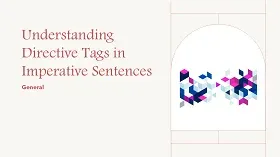Understanding Directive Tags: Softening Commands
"In the rich tapestry of English, directive tags serve as a polite bridge, transforming firm instructions into gentle requests, thereby enhancing interaction."
Directive tags are a subtle yet powerful feature of English grammar, allowing us to soften commands, make polite requests, or involve the listener in a more collaborative way. They are most commonly associated with imperative clauses, adding a layer of nuance to our directives.
Affirmative Imperatives with Tags
Common Tags: Affirmative imperatives are often followed by tags involving 'will you', 'would you', 'can you', or 'could you'. These tags generally serve to issue a directive or make a request.
- Cease that incessant talking, will you.
- Secure this line tightly, would you.
- Ensure you're back by six, please, could you.
Negative Imperatives with Tags
Specific Tag: Negative imperatives are most typically followed by 'will you'.
- Don't misplace my tablet, will you.
- Don't forget to submit the application, will you.
Formal Styles: Softening Directives with 'Won't You'
In more formal contexts, imperative clauses can sometimes be paired with the tag 'won't you'. This usage significantly softens the directive, often making the utterance sound more like a polite invitation or request.
- Provide Mrs. Adams with whatever she requires, won't you, David.
- "I'd very much like a cup of Earl Grey," John said. "Here's the change. Select something for yourself too, won't you?"
First Person Plural Imperatives: 'Let's'
Exclusive Tag: Imperatives beginning with 'Let's' (meaning 'let us') almost invariably take 'shall we' as their tag.
- Let's proceed to the next agenda item, shall we.
- Let's not dwell on that topic now, shall we.
"Directive tags empower us to navigate social interactions with greater finesse, transforming blunt commands into collaborative proposals."
To test your understanding of Directive Tags in Imperative Sentences in English Grammar, click here to take the quiz!












